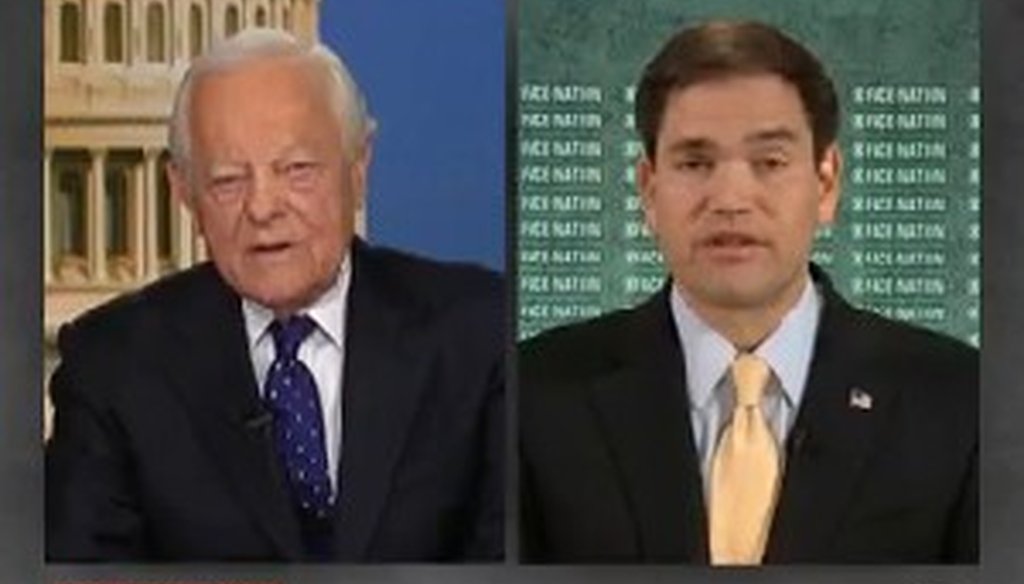Stand up for the facts!
Our only agenda is to publish the truth so you can be an informed participant in democracy.
We need your help.
I would like to contribute

Sen. Marco Rubio, R-Fla., appeared on the Jan. 12, 2014, broadcast of "Face the Nation."
It wasn’t that long ago -- just about two months -- that New Jersey Gov. Chris Christie was smiling away questions from Sunday news hosts about his 2016 presidential prospects.
This week, those same hosts and their guests were debating Christie’s presidential prospects in the wake of revelations that Christie aides engineered traffic problems near the George Washington Bridge as part of a political feud.
Pundits on Fox, NBC and ABC all made certain to point out that there was no direct link between Christie and the forced road closures. But emails from members of Christie’s staff about the incident, including from a deputy chief of staff, could signal a problem with Christie’s management style.
As former Pennsylvania Sen. Rick Santorum (and possible 2016 contender himself) put it, "Personnel is policy."
Other Republicans, however, tried to change the script. Rudy Giuliani on This Week, Reince Priebus on Meet the Press, and Karl Rove on Fox News Sunday all wanted to talk less about Christie and more about the 2012 attacks in Benghazi, Libya.
Sign up for PolitiFact texts
Rove, a former adviser to President George W. Bush, attacked the media for its handling of coverage of the two events.
"The amount of attention paid this week to Chris Christie makes the coverage of Benghazi at the same time ... pale in significance," Rove said on Fox.
Even allowing for a bit of rhetorical flourish, Rove is off is his contention.
Simple searches of the nation’s top newspapers and TV outlets show that -- at the least -- the amount of coverage between the Christie story and Benghazi are similar.
Part of the difficulty in making a comparison is that the events have different sequences of events. The story of Benghazi, and what really happened, has played out over more than a year. The Christie news is still relatively new.
According to the Pew Research Center for People and the Press, a nonpartisan think tank, 43 percent of the country told pollsters they "closely followed" the attacks in Benghazi. That made it the eighth most followed news event, trailing continued coverage of the economy and the U.S. Supreme Court decision on the health care law. It was the only international event in the top 10. When news of the attacks on Benghazi broke, coverage was widespread, and it continued through congressional hearings. Moreover, a lot of the coverage questioned the administration’s narrative and response to the attacks.
"The coverage of Benghazi was heavy, in part because Republicans made an issue of it," said Stephen Farnsworth, a professor of media and politics at University of Mary Washington. "The coverage of the ‘bridgegate,’ if you raise it to the level of a a ‘-gate’ scandal, is a reflection of Christie’s prominence in national politics."
Perhaps the outcome of the Benghazi reports didn’t unearth the conspiracy conservatives alleged and hoped for. More is still likely to come out, and Republicans continue to keep it in the news. But to insinuate the mainstream media ignored the attacks while putting Christie through the ringer goes too far. We rate Rove’s statement False.
Christie wasn’t the only topic covered Sunday. Pundits across the dial also discussed a new book by former Defense Department Secretary Robert Gates that includes some criticism of President Barack Obama.
Talk about the book prompted this claim from former Obama press secretary Robert Gibbs: "We have been in Afghanistan longer now than we have been in any foreign land conducting a war in our nation’s history."
Depending on your definition of "war," Gibbs is right. At more than 12 years, the conflict in Afghanistan has lasted longer than either Iraq war, the wars in Vietnam and Korea and both world wars.
But the Afghanistan war is not as long as broader wars, including the Cold War. It also hasn’t lasted as long as the "Banana Wars" in the Caribbean in the early 20th century. While the Banana Wars were technically longer -- 19 years in the case of Haiti -- experts told us those conflicts didn’t always include fighting.
We rate Gibbs’ claim Mostly True.
Steve Contorno and Katie Sanders contributed to this report. Aaron Sharockman is the editor of PunditFact.com.
Our Sources
See individual fact-checks.




























